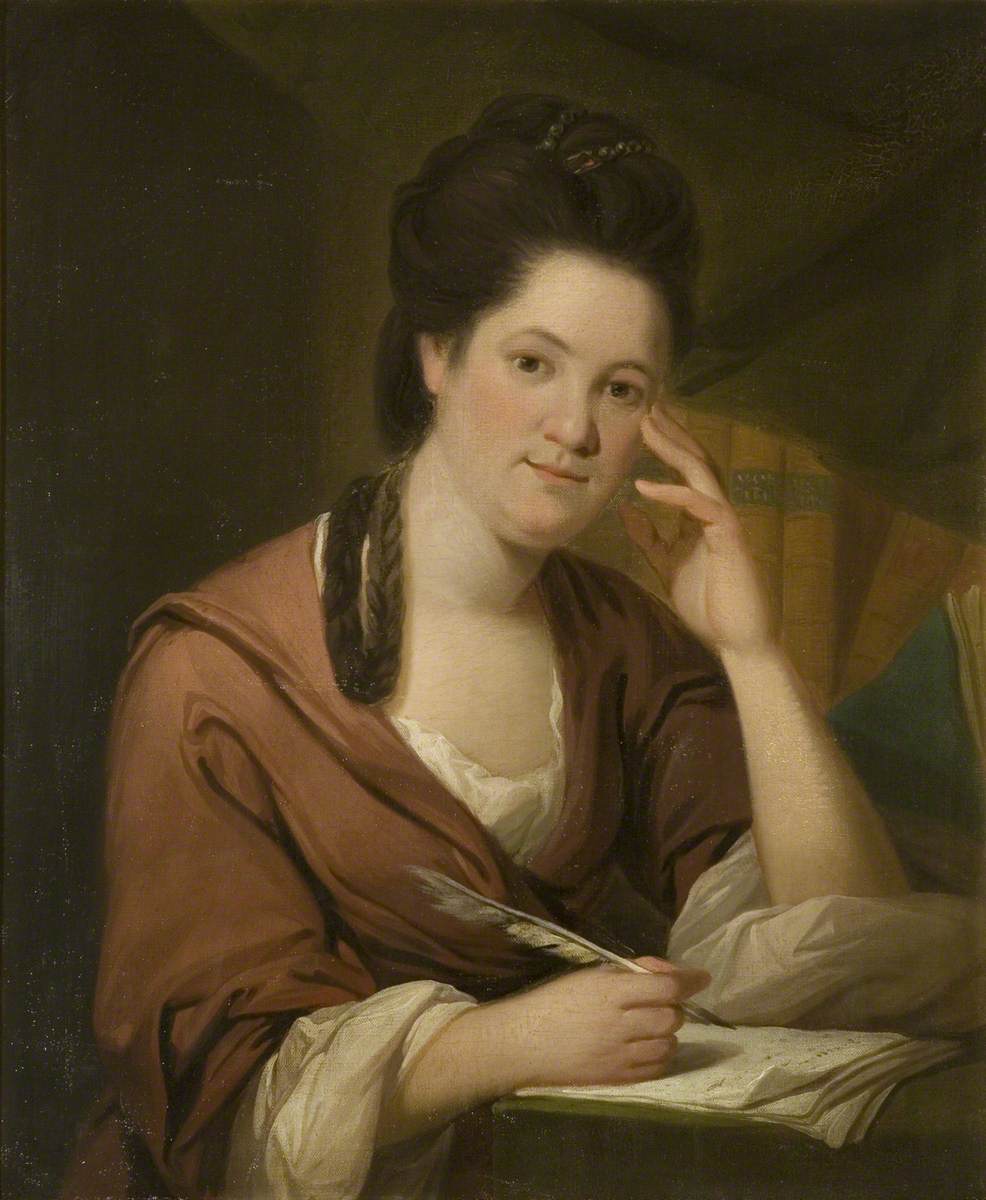Hannah More, a contemporary of William Wilberforce, is known as the most influential British woman of her time—the late 1700s and the early 1800s. Hannah was born in 1745 in Gloucestershire, England, one of five daughters of Jacob and Mary More. Exceptionally bright like her sisters, Hannah could read and write by age four, and her most requested birthday gift was paper, which she used to feed her insatiable appetite to write poems and essays. From her earliest days, she was known for her sharp wit and quick tongue, but also for having a distinct “moral bent.” She did not write merely to entertain; she wrote to persuade.
As a teenager, she began to teach in a school her older sister had founded in Bristol. From very early in her teaching career, she became an outspoken advocate for the rights of girls to be educated. She also was a firm believer in harnessing the power of the imagination in learning. She considered it a great failure if a teacher brokered in “mere verbal rituals and dry systems.” Lessons simply had to be communicated in the most lively and inviting ways possible. While in Bristol, the scope of Hannah’s imagination and experience greatly expanded. She became a fan of the theatre and was welcomed into friendship with some of England’s 18th-century elites. Through these literary and artistic associations, her writing blossomed. Hannah continued to hone her unique way with the pen and at the age of 18 wrote her first play, The Search After Happiness. Her intention was to provide a morally upright drama for the girls she taught, in contrast to the debased content that was so common in the dramatic works of her time and which reflected the moral excesses of the English culture. In 1774 at the age of 29, Hannah moved to London. A family friend forwarded one of her plays, The Inflexible Captive, to David Garrick, the leading actor in London at the time. He immediately took a liking to her, and he and his wife threw open the doors of their home and their social circle to Hannah. She soon found herself in close association with some of the most notable people in London, including Dr. Samuel Johnson, who produced one of the most important early dictionaries of the English language, a forerunner to the magisterial Oxford English Dictionary. That same year, The Inflexible Captive was published and thus began Hannah’s successful career in making her work available to discriminating readers. Hannah was a Christian, and her faith and moral bent were important-- though still developing—influences on her writing. While in London, she also explored how to relate with unbelievers and worked out in practice how to do so without compromising her own growing understanding of Christianity. In her mid-30s, Hannah began to withdraw from the London social scene, concentrating more on the development of her faith than her social network. One biographer said, “More became increasingly disenchanted with the trappings of high society and turned more fully toward the Christian faith she had assumed all her life but not embraced with full intention.” The catalyst for her development was John Newton’s book, Cardiphonia, or utterance of the heart. Here is a brief quotation that demonstrates the kind of influence his work provided for Hannah’s faith: "When I would do good, evil is present with me. But, blessed be God, though we must feel hourly cause for shame and humiliation for what we are in ourselves, we have cause to rejoice continually in Christ Jesus, who, as He is revealed unto us under the various names, characters, relations, and offices, which He bears in the Scripture, holds out to our faith a balm for every wound, a cordial for every discouragement, and a sufficient answer to every objection which sin or Satan can suggest against our peace." Of course, we know John Newton as the slave-ship master turned pastor, who wrote the best-loved hymn, Amazing Grace. Hannah began a long correspondence with this giant of the faith all the while internally struggling with maintaining friendships with the intelligentsia of London. She also began to reflect more deeply on how to cultivate friendships with people who rejected her faith. Consequently, Hannah felt herself being pulled in two different worlds, and she began to consider that perhaps following Christ would mean leaving London and her associations there entirely. In 1782, Hannah published a series of dramatizations of Bible stories, Sacred Dramas, as her first overtly Christian work. This work was largely a product of her internal conflicts, and she sought to demonstrate that “devoutest piety and the cultivation of elegant literature and taste” were not incompatible. It was during this season that Hannah came to the conviction that culture was as much, or even more, influenced by the arts than by legislation. This is consistent with the words of contemporary theologian, Kevin J. Vanhoozer, “Popular culture—more so than the academy or the church— has become the arena where most people work out their understanding of the true, the good, and the beautiful." Hannah understood this and wondered how she might expand her influence in the culture through her writing. In 1787, Hannah visited John Newton to gain wisdom from him. Just a few years earlier, Newton had challenged William Wilberforce to use his influence in Parliament to work for the abolition of the slave trade. He issued the same challenge for Hannah, steeling her resolve to use her pen to influence the culture. Hannah became friends with Wilberforce, and their work, in two different but intimately related spheres of influence, would eventually instigate the collapse of the slave trade and slavery in Britain. As part of her efforts, Hannah penned a poem called Slavery, in which she made the cultural case against the scourge of human trade and ownership. Similar to how Uncle Tom’s Cabin ruptured the conscience of America, Slavery dealt a fatal blow to the commonly held assumption that slavery was a natural and normal part of life in the British empire. Using words meant to enliven the imagination, she painted pictures with her pen of the dark secret the average Briton had never seen—the inestimable suffering of African families at the hands of the slave traders and slave owners. This awakening led to petitions to Parliament signed by hundreds of thousands of everyday people. Hannah’s writing ultimately swayed the hearts of members of Parliament, just as Wilberforce’s fiery speeches did until, in 1807, the slave trade was abolished in England. But Hannah’s efforts were not solely directed at slavery. She also took aim at the worldview and habits of the population that could accept and support slavery. England had become a nation of people who identified as Christians but lived as pagans. Much of the foundation for this worldview was encouraged in the 1700s by the political and moral upheaval in France, driven by the pursuit of decadence and revulsion for tradition. To combat the rising tide of this secular and brutal perspective on the world, which was the moral and intellectual framework for slavery, Hannah began to write a series of pamphlets advocating for Christian values and norms as the only foundation for a just and well-ordered society. She used her well-honed rhetorical skills and entertaining style to move public opinion once again towards a desire for the good, the right, and the true. William Wilberforce is often credited with fomenting the movement that eventually ended the slave trade in Britain and restored a Biblical moral framework to the British Empire. However, as he himself would acknowledge, his efforts in legislation would not have succeeded had Hannah More not been wielding the enchanting power of the pen to reshape the hearts of individual citizens, leading to a renewed conscience throughout the British empire. Comments are closed.
|
Cultivating godly influencersWilmington Christian School provides a distinctively Christian, innovative education that effectively develops Godly influencers who are well prepared for life after high school and who impact the culture for Christ. Archives
May 2024
Categories
All
|
|
Wilmington Christian School provides a distinctively Christian, innovative education that effectively develops Godly influencers who are well prepared for life after high school and who impact the culture for Christ.
Wilmington Christian School admits students of any race, color, national and ethnic origin to all the rights, privileges, programs, and activities generally accorded or made available to students at the school. It does not discriminate on the basis of race, color, national and ethnic origin in administration of its educational policies, admissions policies, scholarship and loan programs, and athletic and other school-administered programs. |
|
|
© Copyright Wilmington Christian School. All Rights Reserved.
Website designed by PROSPER Creative Design
Website designed by PROSPER Creative Design



